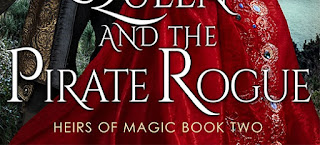Did you ever spend the night with a friend when you were a kid and that friend's family went to church services every Sunday when yours didn't? Your friend's family just automatically assumed you'd go to church with them. Why not? You got to hang with your bestie a little longer.
And then you walked into the alien landscape of someone else's beliefs and rituals. This worked, too, if your family went to a Baptist church and your friend was Catholic. The two traditions are vaguely similar, but the details will really catch you unaware.
Religion is such a great way to convey stranger in a strange land in a story. I love playing with it for that reason. With a single religious scene or reference, my characters can show you that they are wholly invested in a culture, utterly alienated from that culture, or wondering what the heck is up with the culture. In science fiction, there's even more fun to be had. Religions can (and do when left to me) reflect a broad range of sentient beings - not all of which are humanoids. Humans want to look into the face of a human-looking god. Why wouldn't a species of sentient spiders want to focus all of their eyes upon the face of a spider god? I get to bend morality, too. We humans speak of morality as if it's absolute - when it's probably relative based on how your species evolved. Take food, for example. Humans are omnivores. We can, and do, eat just about anything. We attach some morality to food - animals we eat shouldn't suffer. But what if your species evolved from cats? The hunt might be a religious experience. An obligate carnivore eating a kill would probably be a high holy event. How long you could toy with your prey without killing it might be a form of prayer. Yet if your species base evolved from herbivores, predators would be demonized and plants would probably figure in the liturgy.
For most of my books, religion is a backdrop, a way of reinforcing that we're not in Kansas anymore. Most of my characters are only interested in religion from the standpoint that they use a lot of blasphemy when swearing. Edie's from a fundamentalist religious settlement (Enemy Storm) and she offers hints of cultural differences, but the religion doesn't drive the story. It does heighten conflict in that I used it in that book to draw a comparison between who Edie had been and who Edie has become.
In book four, religion becomes a bigger thing. A much bigger thing. The heroine, Ildri Bynovan is a once in a century religious leader - think of the Pope or the Dali Lama. And while she's lost some of her personal faith, she strongly believes that religion is mostly benign, sometimes a bane, and in rare shining moments, a balm. She's in it to bring more of the balm to the members of the various churches under her care. Of course, the hero wants to use her to assassinate someone, so I'm sure they'll get along well.




